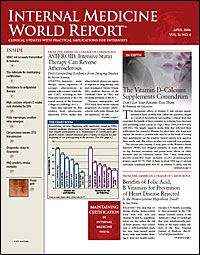Publication
Article
Antihypertensives Appear to Protect Against Alzheimer's Disease
Author(s):
Patients who take antihypertensive medications may be reducing their risk of developing Alzheimer's disease (AD) in their later years by as much as 70%. This is the conclusion of a population-based study of more than 3000 elderly persons aged ?65 years that was ?recently released online in the Archives of Neurology (2006;63:[doi:10.1001/ archneur.63.5noc60013]).
Previous research indicated that hypertension may increase risk for AD, but studies examining the ability of antihypertensive therapy to modulate AD risk produced inconclusive results.
This study included 3308 elderly residents of Cache County, Utah. Of those who provided information on drug use, 1507 were taking antihypertensive drugs and 1790 were not. Antihypertensive drugs used included angiotensin-converting-enzyme (ACE) inhibitors (13%), beta-blockers (11.5%), calcium channel blockers (14.9%), and diuretics (26.5%). About 18% of these elderly individuals were taking >1 class of antihypertensive medications.
After 3 years, 104 study participants had developed AD. Investigators conducted discrete time survival analyses to determine the effect of antihypertensive drugs on the risk of AD.
After adjusting for age; education; gender; number of APOE epsilon4 alleles (which have been linked to an increased risk of AD); and history of stroke, hyperlipidemia, diabetes, and myocardial infarction, antihypertensive medication users had a 37% lower risk of being diagnosed with AD compared with nonusers. The reduction in risk remained significant after further adjustment for duration of antihypertensive drug use and current systolic or diastolic blood pressure level.
The degree of protection offered by antihypertensive therapy varied considerably depending on both class and subclass (Table). While ACE inhibitors and calcium channel blockers as a class had no notable impact on AD risk, both ?beta-blockers and the dihydro?pyridine calcium channel blocker ?subclass demonstrated a trend toward protection.
"However, by far the greatest effect was seen with potassium-sparing diuretics, which were associated with more than a 70% reduction in risk of AD," wrote Ara S. Khachaturian, PhD, and colleagues. They noted that "controlling for blood pressure did not appreciably change the findings."
The investigators listed a number of limitations of their study, including that its observational design could not rule out the possibility of confounding influences. As a result, drug use and AD risk may have been related to other variables and not to each other. They also pointed out the several important strengths of their study, including:
? A large sample size, which allowed eval??uation of different medi?cations while controlling for potential influences
? An entire population was studied, not a convenience sample, which reduced the chances of selection bias
? A very high response rate (90% of eligible residents initially agreed to participate).
The authors concluded by encouraging other investigators to continue the exploration into the possibility that antihypertensive drugs have neuroprotective effects.






